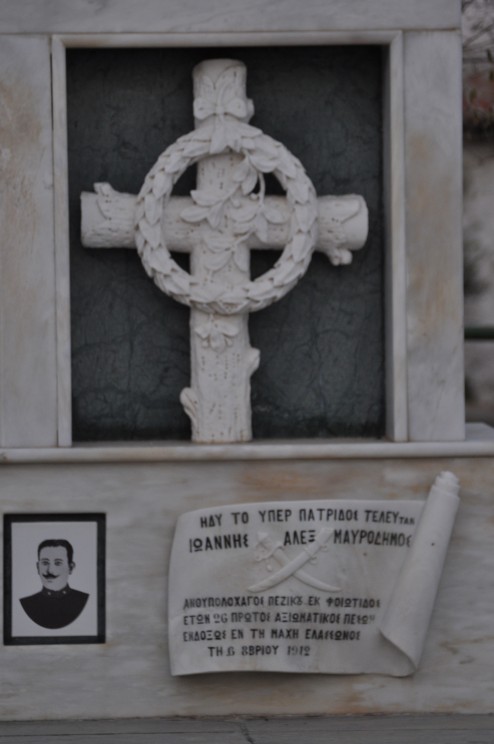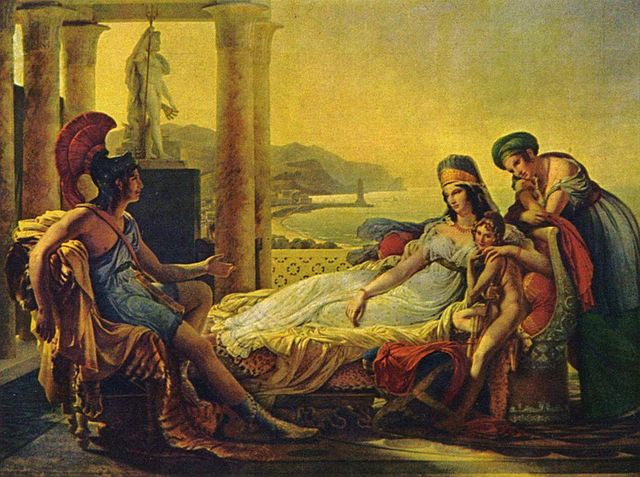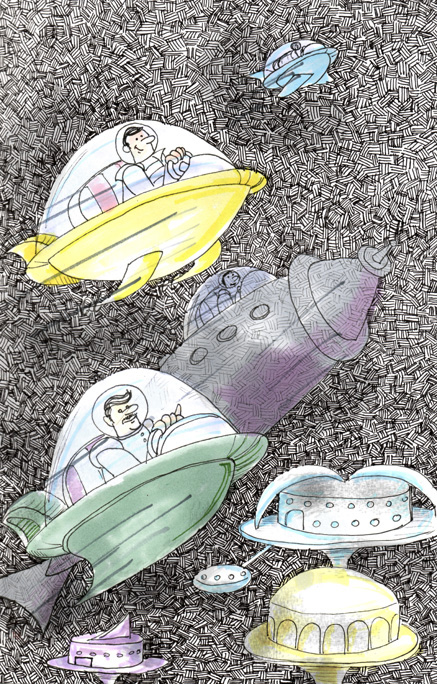The shadow of the Roman poets falls right across the entire western literary tradition: from Vergil’s Aeneid, about the fall of Troy, the wooden horse, and the founding of Rome; through the great love poets, Catullus, Propertius, and Tibullus; Ovid’s Metamorphoses, treasure-house of myth for the Renaissance and Shakespeare; to Horace’s Dulce et decorum est, echoing through the twentieth century. We all take it for granted … so now’s the time to check your working.
The post Can you get X out of X in our Latin poetry quiz? appeared first on OUPblog.
By J. C. McKeown
The National September 11 Memorial Museum will be opened in a few weeks. On the otherwise starkly bare wall at the entrance is a 60-foot-long inscription in 15-inch letters made from steel salvaged from the twin towers: NO DAY SHALL ERASE YOU FROM THE MEMORY OF TIME. This noble sentiment is a quotation from Virgil’s Aeneid, one of mankind’s highest literary achievements, but its appropriateness has been questioned. In the context of the Aeneid, Virgil is commemorating a homosexual pair of warriors killed while making a bloody surprise attack on their sleeping enemies’ camp. Three years ago, an article in the New York Times suggested that “anyone troubling to take even a cursory glance at the quotation’s context will find the choice offers neither instruction nor solace.” But the museum was unmoved by such objections, and its director has recently defended the choice, asserting, perhaps rather cryptically, that the quotation characterizes the “museum’s overall commemorative context.”
It is unfortunate that this controversy has arisen, especially since so few people nowadays know about the context of the quote in the Aeneid. Those who lost family members or friends in the attacks should not have their thoughts and feelings distracted in this way. The sentiments expressed on national monuments aim to be strongly and unambiguously assertive of a view held by the whole community, but perhaps they are inherently vulnerable to controversial interpretations. Ideally, of course, such quotations should resonate more deeply than the meaning of the actual words, but would it not be best to accept the obviously sincere intentions of the museum’s committee and let the matter drop?

“It is sweet and fitting to die for one’s country” in classical Greek on a memorial honoring the dead in the First Balkan War. Credit: J.C. McKeown
Otherwise, where will it end? Should we hesitate about using dulce et decorum est pro patria mori (“It is sweet and fitting to die for one’s country”), a line by Horace, Virgil’s contemporary, found so often on war memorials? In the 1910s, it was inscribed at Arlington and at Sandhurst, the British military academy, and was even translated into classical Greek (mirabile dictu!) on a memorial honoring the dead in the First Balkan War.
Before the decade was out, however, in the most celebrated of all World War I poems, Wilfred Owen had described Horace’s line as “the old lie.” Horace’s own authority to voice such ideals may be questioned. He was writing a poem of national significance–it is one of his “Roman Odes”–but the very next line, “death pursues even the man who runs away,” might make us recall a different poem in which Horace rather flippantly admits that he had thrown away his shield and fled at the Battle of Philippi. These considerations may give us pause for thought, but the validity of dulce et decorum in a national context is not diminished.
Carpe diem is perhaps the most ubiquitous of all Latin tags, but few people are aware of its original use: Horace is trying to persuade a girl to sleep with him. In another quote from the same book of Odes, Horace assures us that a person who is integer vitae scelerisque purus (“He who lives an unblemished life and is not tainted with crime”) is under divine protection, but the poem is essentially trivial, for Horace’s guardian deity turns out to be Cupid, who keeps wolves at bay while he sings in the woods about his mistress; even so, the poem was sung for centuries at Swedish funerals.
The fundamental democratic principles of equality and unity encapsulated so precisely in e pluribus unum are surely not diminished by the possibility that it was inspired by a phrase from an inconsequential poem attributed to Virgil: color est e pluribus unus (“from being several, the color is one”), in a description of an old peasant grinding the various ingredients together to make a vegetable pâté for his breakfast.
We have difficulties enough with the nuances of our own language. How many of those who wear T-shirts emblazoned with The Road Not Taken regard Frost’s best known poem not so much as a declaration of their free spirit, but rather as “that cunning nugget of nihilism disguised as an anthem for nonconformity” (New Yorker, 10 February 2014)?
Even Virgil himself has been charged with quoting inappropriately. When Aeneas stammers to Dido’s ghost in the Underworld, invitus, regina, tuo de litore cessi (“unwillingly, O queen, I left your shore”), it is an undoubted echo of Catullus’s translation of an elegant Hellenistic court poem, in which a lock of Queen Berenice’s hair laments that it is now a constellation, no longer with the queen: invita, o regina, tuo de vertice cessi (“unwillingly, O queen, I left your head”). To quote the standard commentary on Virgil’s line: “modern susceptibilities are pained by Virgil’s presumed indifference to the incongruity so produced.”

Aeneas tells Dido the misfortunes of the Trojan city. Oil on canvas, 1815. Pierre-Narcisse Guérin, The Louvre. Public Domain via Wikimedia Commons.
There is classical precedent for changing a memorial inscription. After the Greek victory over the Persians at Plataea in 479 BC, the Greek commander set up an inscription at Delphi: “Pausanias, leader of the Greeks, when he destroyed the army of the Persians, dedicated this memorial to Apollo.” He was ordered to remove it, and told he could put it up again when he had defeated the Persians single-handedly. Might that be the best solution to all this controversy? The task of re-writing the inscription might be given to Billy Collins, who was Poet Laureate at the time of the attacks. He would be sure to resist those who want to:
“tie the poem to a chair with rope
and torture a confession out of it.
They begin beating it with a hose
to find out what it really means.”
J. C. McKeown is Professor of Classics at the University of Wisconsin-Madison, co-editor of the Oxford Anthology of Roman Literature, and author of A Cabinet of Greek Curiosities, A Cabinet of Roman Curiosities, and Classical Latin: An Introductory Course.
Subscribe to the OUPblog via email or RSS.
Subscribe to only classics and archaeology articles on the OUPblog via email or RSS.
The post The 9/11 memorial and the Aeneid: misappropriation or sincere sentiment? appeared first on OUPblog.

By Robert Cowan
“Free speech is the whole thing, the whole ball game. Free speech is life itself.” So wrote Salman Rushdie and he should know. Certainly free speech is routinely held up, often unreflectively, as an unambiguous, uncontroversial good – one of Franklin Roosevelt’s four freedoms, the right for which Voltaire would famously die, even if he disapproved of what was being said. In the age of WikiLeaks, the freedom to disseminate information and its corollary, the freedom to know what those in power have said or done in secret, have found ever more vigorous proponents, but also those who ask whether it has its limits.
It has always been problematic whether freedom of speech should be extended to those whose speech is considered abhorrent and who might even argue against others’ freedom of speech. Voltaire may offer to lay down his life and Chomsky may assert that “If we don’t believe in freedom of expression for people we despise, we don’t believe in it at all”, but the very power of speech which makes its freedom so desirable can also render it an instrument of discrimination, violence, and oppression. It is no coincidence that it is often groups such as the BNP or Qur’an-burning pastors who hold up free speech as a banner under which they can use that freedom to demand the curtailment of others’ freedoms. Even more directly, the dangers of verbal incitement to hatred – be it on racial, sexual, or other grounds – are increasingly recognized in both the statute books and the public consciousness.
WikiLeaks has highlighted the other potential danger of free speech, that, in the famous words of the World War II poster, “careless talk costs lives”. Many have used the rhetoric of being willing to die for the right to free speech, but the issue becomes more problematic when it is soldiers who are dying in Afghanistan because of outrage at revelations of undiplomatic diplomatic cables. Once again, there is no coincidence that it is in times of war and unrest that the issue of free speech becomes particularly fraught. It is then that its negative ramifications can be most keenly felt, but it is also then that it is most under threat from the pressures of power and expediency, then that it most needs defending.
So what does all this have to do with the Roman poet Horace? Horace too was writing in a time of war and political upheaval. As he composed his Satires in the 30s BC, Rome had suffered almost a century of civil unrest exploding into outright civil war at regular intervals, and the final bout between Octavian (the future emperor Augustus) and Mark Antony was just around the corner. Horace himself had fought on “the wrong side” at the battle of Philippi in 42 BC, in the army of Julius Caesar’s assassins, Brutus and Cassius, against the ultimate victors, Octavian and Antony. Taken into the circle of Octavian’s ally and unofficial minister of culture, Maecenas, Horace had his status and his finances restored. It was at this point that Horace wrote book one of the Satires. These poems are full of profound human insights and uproarious, often filthy, humour, as can be experienced in John Davie’s lively new translation, but there is one large oddity about them. Horace chose to write satire, the genre of the 2nd century BC poet Lucilius, famed above all for his fearless freedom of speech, and he chose to write it in the period of probably the greatest military and political upheaval Rome ever underwent, but he “doesn’t mention the war”.
Not only does he not mention it, he goes out of his way not to mention it. Again and again there are opportunities to engage with the important political events in Rome and around her Mediterranean empire, but Horace repeatedly refuses. Satire 1.7 is all about Brutus’ time as governor of the provi
The weekly challenge word on sugar frosted goodness is "transportation".

In this quick illustration, I thought of a 1950s vision of the world of transportation, circa 1987.
Wow! Where was my head? Thursday came and went and with the holiday hulabaloo, I completely forgot to post the next SFG Challenge! Whoops!
Without further delay...
This week's theme: Transportation
The SFG Challenge runs Thursday to Thursday, and was created to offer every member an opportunity to stretch their creative muscles, venture outside of their artistic boundaries and post their interpretations each week on a specific theme. This is a completely voluntary challenge!
Be sure to label your illustrations with the appropriate labels as well. Label your entries with your name and the challenge label, in this case SFG: Transportation.
By the way SFG'ers, we've had a number of new members join recently, with quite a few more on their way in. Please make them feel welcome!
The next challenge begins Thursday, November 29th, 2007.
Have a great week SFG'ers!
-Jeff






Now, that's one angry driver. I like the energy in the illustration.
Nice stuff Michelle,,,please stop that lady before she crashes....!